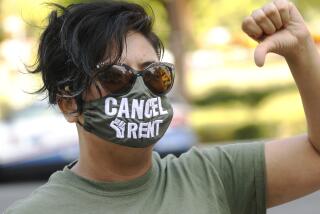Reaction Mixed to Decision on Panhandling Law
- Share via
Outside the door of his toy store on the edge of downtown Los Angeles’ skid row, Charles Woo says he has watched as aggressive panhandlers startled potential customers, frightened his employees and made a general nuisance of themselves.
Anything the city can do to keep in-your-face beggars out of his face would be good news, he said. Woo got that encouraging news this week in a decision by the California Supreme Court that improves the city’s chance of implementing an anti-soliciting ordinance that has been on the books for three years but never enforced.
The ordinance prohibits aggressive forms of panhandling everywhere in the city and also bars soliciting near ATMs, outside dining areas and in and around public transportation. Approaching motorists for money is banned, as is soliciting in parking lots after dark.
“The ordinance will clearly bring more customers and help my employees feel better,” said Woo, who is a vice chairman of the Los Angeles Chamber of Commerce. “Unfortunately, places like downtown do have a reputation. People don’t want to come because they fear crime and see panhandlers intimidating everyone. This might help to bring about a more positive image.”
But like many rules that try to delineate the limits of free speech activities, the Los Angeles ordinance has elicited fiercely differing viewpoints. And the court’s decision has refocused attention on whether cracking down on quality of life nuisances can really affect the vitality of a city.
Some businesspeople, like Pedro Cruz, are ambivalent. In his 12 years as manager of Venice Beach’s Sidewalk Cafe, Cruz said, he and his customers have gotten used to people begging.
“I’ve seen it bad and I’ve seen it good,” said Cruz, who was doing a brisk business. “The worst is gangs shooting in front of the restaurant, not people asking for money. If some of these people weren’t out here, some of our customers wouldn’t be either. This is Venice Beach, not downtown.”
A few feet away and within earshot of the diners, a man begged for cigarettes and money from a passerby. When the man refused, the beggar shouted obscenities at him and walked away, mumbling at everyone he passed.
Down the boardwalk, Michael Carr of Evanston, Ill., handed $2 to a man who asked him for money.
“It’s no big deal to ask for money in public,” Carr said. “If I don’t want to give it to them, I won’t. I didn’t think he was going to rob me if I didn’t.”
The state Supreme Court ruled that the Los Angeles ordinance appears to be constitutional. The case will now be sent back to a federal appeals court for resolution. City officials and even opponents of the law agreed that the ruling handed down Thursday makes it far easier to fend off legal challenges.
Opponents deplored Thursday’s decision, calling it a 1st Amendment nightmare. They also argue that much of the prohibited conduct in the ordinance is already covered by other laws.
“This is one more tool to harass people,” said Peter Eliasberg, an attorney with the American Civil Liberties Union of Southern California, which challenged the law.
What is more, Eliasberg asserted that the ordinance is a wolf in sheep’s clothing, with solicitation bans written so broadly that it could result in the roundup of Girl Scouts selling cookies, Salvation Army bell-ringers and people selling newspapers.
City officials disagree.
“When is the last time you saw a Salvation Army person threaten bodily harm to get a donation, or a Girl Scout use violent profanity to solicit?” said Deputy City Atty. Candice Horikawa. “While technically they are not exempted because of their status, you just don’t see them engaging in the type of activity where this would apply.”
Carol Schatz, president of the Central City Assn., said the ordinance and the court ruling are about the rights people have to their own personal space.
“It’s about time the courts recognized the rights of ordinary citizens to walk the streets without fear of being accosted by beggars hiding behind the 1st Amendment,” she said. “No one objects to being approached by the Girl Scouts, but what do you do when a beggar asks for money and doesn’t go away?”
More to Read
Sign up for Essential California
The most important California stories and recommendations in your inbox every morning.
You may occasionally receive promotional content from the Los Angeles Times.














